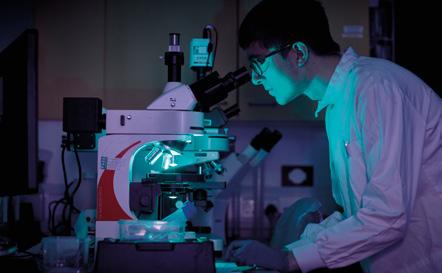
1 minute read
Biosciences
from YSJ 2021 Prospectus
by York St John
BIOSCIENCES We offer courses in these subject areas: Applied Biosciences | Biomedical Science UNDERGRADUATE PROSPECTUS
Bioscience is the study of the biology of living things. All of our courses have a strong research-informed curriculum. Applied Biosciences provides you with opportunities for industry placements, or NHS placements for Biomedical Science, in addition to your extended research projects. As a graduate of these courses you will be able to demonstrate essential scientific skills alongside key transferable skills relevant to your future career goals.
All of our courses allow you some flexibility to tailor your degree progression to suit your passions and developing skill-set. They incorporate extensive practical sessions in state-of-the-art laboratories, designed to support your subject specific knowledge. Discover a new world: • Ever wondered who analyses your tissue or blood sample? It is not the doctor or nurse, it’s a Biomedical Scientist. • Explore the causes of disease at the molecular level. Discover a range of exciting and novel treatment strategies. • Do you have a natural curiosity? Investigate molecular mechanisms and disease stratification of cancer. • Bioinformatics is the future of Biology. At the frontier of Biosciences, you will investigate big data to benefit society.
93% of Biomedical Science students were satisfied with their course. (National Student Survey 2019)
See all of the courses we offer on pages 79-84.
Join our Students as Researchers scheme and work alongside staff on a research project.
We have outstanding laboratory facilities to help support you in your studies. These include:

• Modern teaching laboratories for 15-20 students • Bespoke and brand new scientific equipment for all practical classes • Support from subject-specific technical staff • Further laboratories with specialist equipment for student research projects and academic staff research • Opportunities for students to develop laboratory skills in supported open learning sessions.








